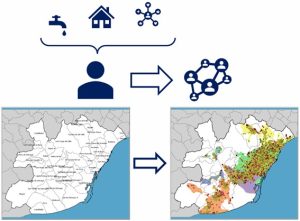Date: 4-7-2025
PhD dissertation "Models Basats en Agents com a Eina per a una Gestió de l'Aigua urbana Centrada en l'Usuari", by Pol Vidal Lamolla
Agent-based models as a tool for user-centered urban water management
Abstract:
Pol_Vidal_PhD_dissertation_CAT_ES_EN
Water management in cities is a challenge that has evolved over time. Today, factors such as climate change and the connection between water and other areas (energy, economy, lifestyle) make it more complex. It is no longer just a question of technical solutions, but also of social issues, and often there is not a single correct answer, but several possible options. In the Barcelona Metropolitan Area, with a large and complex supply infrastructure, its management requires to consider the different perspectives of urban water. In this context, the use of artificial intelligence can lead to simulations that help make decisions before implementing real changes. Specifically, agent-based models (ABM) simulating people’s behaviour in response to different measures.
Pol Vidal Lamolla’s doctoral thesis has applied these models in four cases that, despite going beyond the Barcelona Metropolitan Area, are relevant for urban water management within this geographical context. The objective is to analyse how users respond to various policies. For example, purely economic demand management measures or in combination with measures of a different nature, such as behavioural nudges. But also changes in the operation of the infrastructure with the aim of saving water or its development considering how the impact generated changes territorially. This allowed finding out the tariff modifications with the greatest impact on consumption, how to better help households with few resources or which times are most suitable for applying saving measures.
This thesis, developed within the framework of an industrial doctoral project with Aigües de Barcelona, has been directed by Dr Manel Poch from the Laboratory of Chemical and Environmental Engineering (LEQUIA) research group of the UdG and by Dr María Molinos Senante from the Institute of Sustainable Processes (ISP) research group of the University of Valladolid. In this sense, it constitutes a further step in LEQUIA’s research to apply agent-based modelling to the urban water cycle from an interdisciplinary approach, by means of artificial intelligence techniques, water resources science, social sciences, and environmental and economic assessment methodologies. These simulations offer valuable information for urban water managers such as those from Aigües de Barcelona, and open the door to a future where water management is more efficient, sustainable and adapted to social needs. It is also worth noting that the researcher has identified key areas for improvement in future works such as, for example, requirements for modelling with agents that more accurately represent reality, considering whether greater complexity/opacity of the models may have counterparties, or studying the social acceptance of ABM from an ethical and transparency perspective.
Publications:
- Understanding the Residential Water Demand Response to Price Changes: Measuring Price Elasticity with Social Simulations. Vidal-Lamolla, P.; Molinos-Senante, M.; Poch, M. Water2024, 16, 2501. https://doi.org/10.3390/w16172501
- Assessing urban water demand-side management policies before their implementation: An agent-based model approach Pol Vidal-Lamolla, María Molinos-Senante, Luis Oliva-Felipe, Sergio Alvarez-Napagao, Ulises Cortés, Eduardo Martínez-Gomariz, Pablo Noriega, Gustaf Olsson, Manel Poch, Sustainable Cities and Society, Volume 107, 2024, 105435, https://doi.org/10.1016/j.scs.2024.105435
- Agent-based modelling to simulate the socio-economic effects of implementing time-of-use tariffs for domestic water. Pol Vidal Lamolla, Alexandra Popartan, Toni Perello-Moragues, Pablo Noriega, David Saurí, Manel Poch, Maria Molinos-Senante, Sustainable Cities and Society, Volume 86, 2022, 104118, https://doi.org/10.1016/j.scs.2022.104118




